News
Fuel costs bring more pain to the poorest
The increase in fuel prices for the second time in two months, in keeping with a Cabinet-approved pricing formula, has sent up prices of goods and services, increasing the burden on households.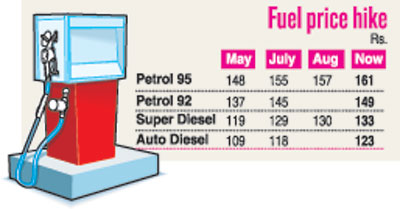
The latest fuel price hike on Monday saw a litre of petrol, both 92 and 95 octane, go up by Rs4 while a litre of super diesel increased by Rs3 and auto diesel by Rs5.
The main victims of the price rise are farmers who transport their goods to Colombo in lorries, and long-distance travellers.
The farmers have to pay more to run their tractors as well as for transport of their produce, Madatuwa Farmers Association President Chamara Bandara explained.
Transport from Kekirawa to Colombo now costs Rs1,000 to 2,000 more.
Lorry drivers have increased by Rs100-200 the cost of transporting a 50kg gunny bag of vegetables.
Transport service provider K D M Shantha Bandara said he now spent Rs9,000 a day on diesel compared to about Rs8,200 before the first fuel price rise in May.
“I transport vegetables from Kandy to Manning Market in Colombo and I don’t want to charge poor farmers big amounts, but with costs going up we are forced to charge them more,” he said.
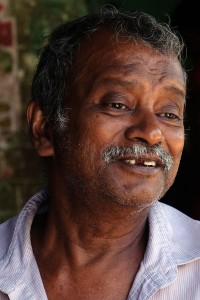
L A Chandralal
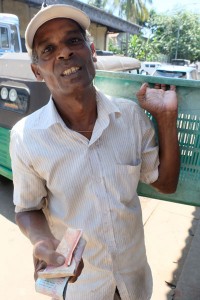
Wasantha Kumar
Vegetable seller L A Chandralal, 63, said it was difficult for him to support his family as his expenses have increased. He earns Rs1,200-1,500 daily.
“The daily wage is barely enough to provide for my two sons who are sitting for their Advanced Level examinations shortly. We have to pay for tuition classes, and the electricity bill is around Rs3,000 monthly and the water bill is about Rs700,” he said.
Bus drivers complain that the government’s fuel-pricing formula kept prices increasing every month. They add that a rise in bus fares would be bad for business.
“The bus owner expects a profit when we refuel the bus on return to Panadura,” bus driver Chaminda Priyakumara Wijesuriya, who works the Pandura-Colombo route, said. “A month ago, we could fill the fuel tank for Rs6,800. After Monday’s sudden fuel increase we had to spend Rs7,500 for the same amount of diesel.”
This meant it was harder for the owner to make a profit and pay the drivers, he said. Ten years ago, drivers could easily take home a monthly income of Rs50,000 but now, Mr. Wijesuriya said, he is struggling to keep his income over Rs24,000.
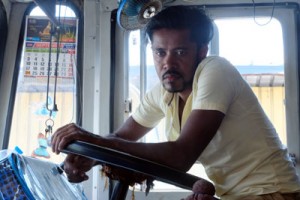
One of the many disgruntled bus drivers Pix by Amila Gamage
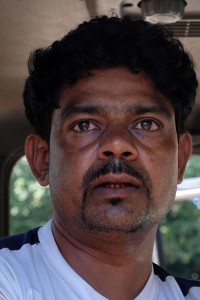
Shantha Bandara
He lives in a boarding house and has to pay rent as well as send money to his wife and children in Nochchiyagama, Anuradhapura.
“I have not been home for two months as I have only saved Rs10,000 this month. The previous month I only earned Rs13,000. I am ashamed to go home like this,” he said.
He said each week he had to spend Rs1,000-2,000 in traffic fines.
Every rise in fuel prices squeezes trishaw drivers who often operate on small margins, as Chandrasiri Dias’s budget shows. Mr Dias spends Rs2,000 to travel 90km daily from his home in Mawanella to Colombo and engage in business from 10am to 6.30pm.
“I leave home around 5.30am to travel to Colombo, seeking hires on my way to make some money. Within Colombo I charge Rs80 per kilometer as I have to cover my food and travel expenses, and take home an income,” he said. He must make at least 10 hires to make a living.
The President of the Bakery Owners Association, N K Jayawardena said if fuel prices increase again next month the prices of bread and pastry products will rise in turn even though bakers have just increased bread prices by Rs5 following a Rs5 rise in flour prices.
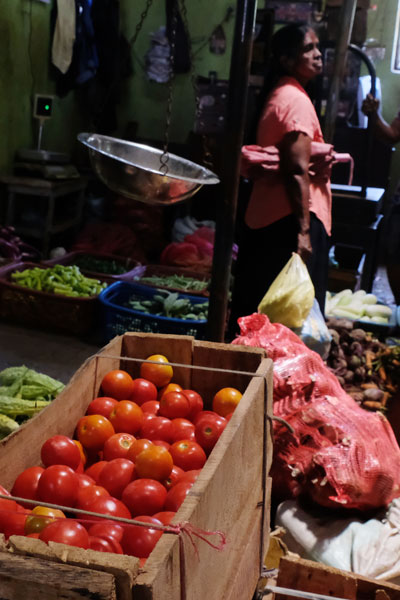
The increasing price of produce
Meanwhile, consumers say they are caught between the government and traders who increase prices at their whim and fancy.
As prices creep up everywhere, life is getting harder for people without much money.
Wasantha Kumar, a 60-year-old “nattambi” porter who works at the Manning Market in Colombo, lifting heavy boxes of goods from morning to dusk (6am to 6pm) makes just Rs1,500-2,000 a day, from which he spends about Rs500 for lunch and tea. From the rest of the money he has to find his monthly rent of Rs10,000 as well as send money to his wife and children.
Chandrika Wijetunga, who came to Colombo from Moneragala on Tuesday to seek treatment at the Colombo National Hospital, wanted to catch an airconditioned intercity bus home to rest her damaged knee but could not afford the Rs. 800 fare asked on Wednesday. Because of her hospital appointment she missed the only Sri Lanka Transport Board-operated bus that day, which left at 1pm and so was forced to take a private bus.
“I spent the night at the lodging I normally stay at but here too they have increased the rent,” she said.

